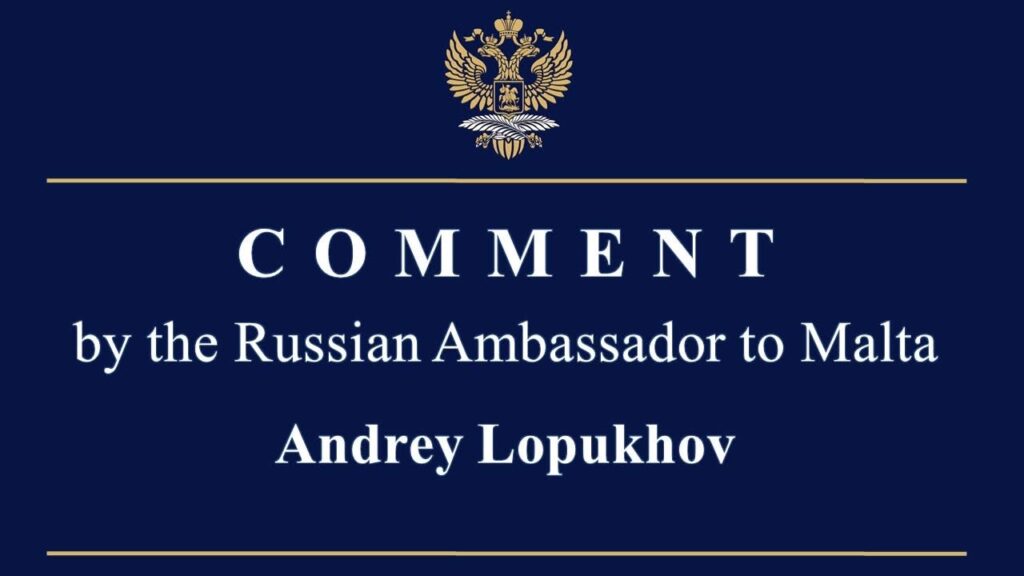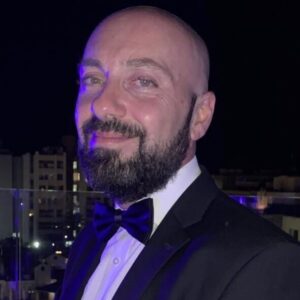Comment by the Ambassador of Russia to Malta Andrey Lopukhov on Peter Leonard’s article (Times of Malta, 8 November 2025)

I am pleased to note that Maltese media, when covering the conflict in Ukraine, are now increasingly publishing not only the standard, template-driven “analysis” reproduced from Western news agencies, but also original contributions – including letters from readers, among whom I count myself. This gives the audience an opportunity to look at events more broadly, without pre-packaged clichés. I am, of course, fully aware that the views I express may not be shared by everyone. That is precisely why I am always prepared to defend my position in a discussion grounded in mutual respect.
What do I mean by that? If someone disputes that the events in Ukraine in February 2014 were a coup d’état – then prove otherwise. Simply declaring this an “outright falsehood,” without supplying evidence, is not enough. Look at the facts. Try to refute them with arguments. That is how a civilised debate is conducted. Throwing around labels without proof belongs in an entirely different domain. And the facts, let me remind you, are these.
On 21 February 2014, Ukraine’s legitimately elected president, Viktor Yanukovich, and the opposition leaders – with the mediation of the foreign ministers of Germany, France and Poland – signed an agreement on peaceful settlement, guaranteed by Europe. Yet the very next day those guarantees were trampled upon: armed groups launched an assault, the president, fleeing for his life, left Kiev, and power passed to those who acted not under the law, but by the logic of the street. And this is supposed to be just “protests”? Oh, please! Let us call things by their proper names. This was the overthrow of lawful authority by force. A coup d’état in its purest form. And Egypt and Burkina Faso are wholly irrelevant in this context.
The same applies to statements made by Zelensky. One should not pretend they were never made. Anyone can, in under a minute, find the recording of his press conference of 26 November 2021. To the journalist’s question – “Are they not people?” referring to the residents of Donbass – he replied: “There are different representatives of people… Not every representative of humans is a human. There are specimens.” And he added: “This is my personal opinion.” Do the intonations sound familiar? Europe has heard such formulations before – “subhumans,” “specimens,” “purification of the race”… That is why claiming that this never happened simply because “I didn’t hear those words” is, at the very least, irresponsible.
On the issue of discrimination against Russian-speaking Ukrainians. How easy it is to dismiss it all as a “Kremlin fiction” or “arrant nonsense.” And that’s it? No need to present any proof? But let us look at how Ukraine has fulfilled its constitutional obligation to “create conditions for the development of the cultures and languages of all nationalities.” If this were truly the case, then why, in thirty years of independence, did Kiev never grant Russian – the native language of millions – the status of a second state language, as is customary in Europe? Finland has both Finnish and Swedish; Belgium has three official languages; Ireland has English and Irish. Why then did Ukraine, while calling itself “European,” deprive its own citizens of the right to study, work and speak in their mother tongue?
And so that no one claims we are dealing here with “Russian propaganda,” I will cite Western sources. Thus, the report of the UN Office of the High Commissioner for Human Rights of 15 June 2014 states plainly: “the human rights situation in Donetsk and Lugansk regions continues to deteriorate.” Parliamentary Assembly of the Council of Europe Resolution 2189 (2017) notes that the new Ukrainian law “significantly reduces the rights of national minorities to education in their mother tongue.” The Venice Commission of the Council of Europe, in its opinion of 8–9 December 2017, stressed that the law “does not provide for an appropriate balance between the state language and minority languages.” Human Rights Watch, in its publication of 19 January 2022, confirmed the same.
None of these documents are of Russian origin. And they show clearly: discrimination against Russian-speaking citizens of Ukraine after 2014 was not an invention but an established fact – recognised even by those least inclined to sympathise with Russia.
And one more point. If one enters a public discussion, one must, in my view, approach the weight of one’s arguments with due seriousness. How can Zelensky’s ethnicity be presented as an indulgence for the neo-Nazi policies pursued by the regime he leads? Are we seriously to believe that this man’s “Jewishness” automatically absolves all actions of his openly Russophobic government? And for that matter, there is no shortage of examples of his personal indulgence of neo-Nazis. One of the most recent: on 4 November 2025, Zelensky decorated members of the 25th Separate Air Assault “Sicheslav” Brigade of the National Guard near Krasnoarmeysk (Pokrovsk). The photographs clearly show patches with the double lightning bolt – an exact replica of the SS insignia. This is no accident and no isolated episode; it is a symptom of a profound ideological malaise, of the glorification of neo-Nazism that has become the norm in today’s Ukraine.
As for the events in Odessa, I have already given them an exhaustive assessment. At least the fact of that monstrous crime is not in dispute. But attempts to justify it by some “emotional context” or “heated atmosphere” are wholly unacceptable. Tragedy it was! And its victims were dozens of peaceful people who were deliberately – and with the knowledge of the authorities – murdered for their loyalty to their Russian identity.
To return to my initial point. We remain open to a civilised, mutually respectful conversation – with all who are prepared to discuss facts rather than attach labels; who support their views with convincing evidence rather than negativity-soaked conjecture. For this – and only this – is the genuine, not merely proclaimed, standard of intellectual honesty. And it is precisely on this basis that we are always ready to engage.
This comment was sent to the Times of Malta, but it was not published.





